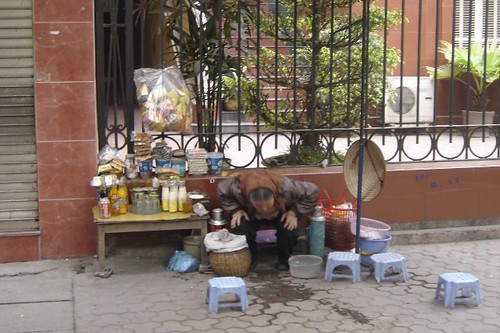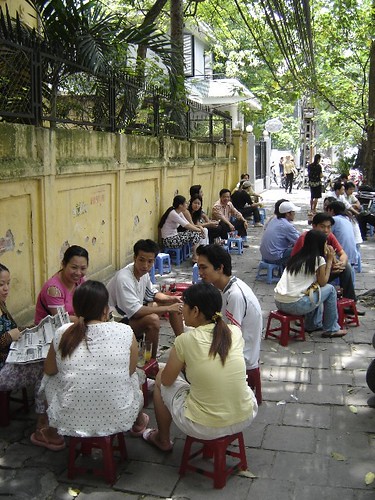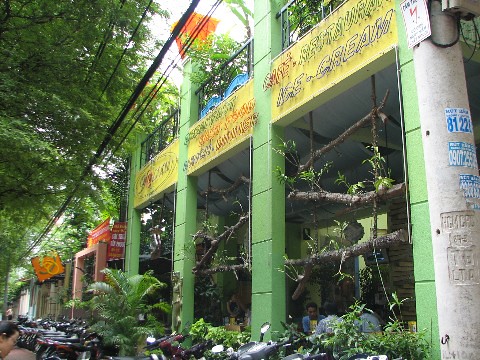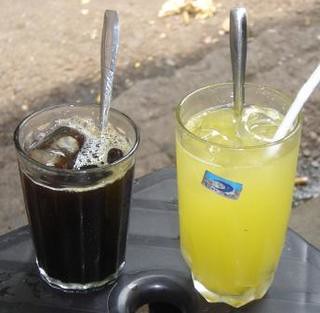A woman or a man who sits on the pavement with a very small table displaying tea, rustic tobacco, rice wine and chewing gum is a long tradition and very common in northern Viet Nam. Most young and old men use them from morning til midnight. This is one of the smallest kinds of business that need to be maintained.
A motorbike will suddenly stop and turn onto the pavement and the driver sits down and has a cup of tea, or rice wine and smoke of the rustic tobacco. There are thousands of this kind of tea shop along the streets from the busiest parts of the city to the suburbs and you can see all types of people in life. From a famous singer, young guys or girls with very fashionable clothes, an architect, a farmer or a xe om to teenager students. They all drink tea and smoke as part of their daily routine. I think this is a good thing that needs to be mantained. It's also a chance for old people to earn some extra money, meet old friends, talk about politics and tell stories.
Despite the hundreds of expensive cafes with free wifi, the tea shop is still alive. For as little as 1000 dong, they can have a hot or cold cup of tea and a cigarette, look around at people walking along, and get the latest gossip from the street.
Can you open this kind of business in your own country? In Viet Nam, we don't need any licence to open a street tea shop.




7 comments:
When I lived in Philadelphia, (city in northeastern U.S.) there were all sorts of food vendors. They had to be licensed. The food cost much less than a restaurant and was usually very good.
Here in Florida, it is popular to sell barbecued meat by the side of the road. Usually, the vendor has a smoker (big round metal barrel) to cook the meat. He also has a small kitchen in a trailer to cook other things and serve the food. You can get very good smoked pork, chicken or pork ribs with some beans, bread, and potato salad (cold). Food is usually not cheap but it is good. You get the food in a styrofoam container with some plastic utensils and a napkin. Some places have a small tent or a few plastic tables and chairs for eating at. Others have no place to eat, you need to take it home.
The vendor has a truck to pull everything home with him at the end of the night. However, some of them leave the smoker or the serving trailer on the corner by the side of the road. They lock it for the night. I wonder if they ever got stolen. Anyway, if business is not good, he can just move to another corner. I call these people roadside barbecue. I have always wondered if they have licenses.
One vendor near me that is has good food is called Squirrel's Barbecue.
In the United States, everything you sell is regulated.
You especially need a license to sell any kind of food, a health permit that says you know how to keep and serve hot and cold food at the right temperatures so people don't get sick from spoiled food.
In most cities, you also need a business permit that says you are paying the right sales and income taxes. All these permits cost money every year.
Many cities have food carts, especially in the downtown/central business areas.
In Kansas City, Missouri (a larger Midwestern city), there has been some controversy lately between "established" people and newer and "different" people, (in this case Hispanics who are often from Mexico and who are sometimes living here illegally).
The white people always assume that anyone selling Mexican food from a cart is doing so without the proper license. Sometimes it's true, but I actually like the free market aspect of it and the fact that the immigrants are just bringing to us a form of their culture.
And, as far as I know, no one has gotten sick.
Some people are able to get away with selling food out of their homes or just the back of their car. For example, they open up a little cafe at night, when the city doesn't have anyone to do inspections. Again, this is what I have seen some Mexican families doing. It's technically illegal, but it serves the people who are used to having such things.
In the more rural areas of the Midwest, there is a tradition of selling farm produce from the side of the road near your farm or at a good intersection. It doesn't seem like anyone has a permit for that.
You can sell produce, shoes, and other things in the city from the side of the road if you have the business permit and the permission of the property owner to be there. You can't do it from a public sidewalk or street, for example. A number of people still do, though, because police have more important things to do than enforce business licenses.
In Vietnam right now, how do the tobacco and tea vendors decide who gets to be in which place? Without a permit system, are there a lot of arguments or is it just based on tradition? Maybe the spot belongs to whoever is the first one to wake up and get there every morning?
As the others have mentioned, there are many regulations and rules for any vendors. I heartily agree that these parts of daily culture you describe - tea, smoke, conversation, and community - are all worthy of preservation and respect!
Always a pleasure to visit your blog. Thank you for sharing your world with all of us!
JLB
I miss the street tea shop. I really enjoyed that part about Vietnam. I though the tiny stools/chairs were funny. I am a tall Westerner. Its hard to sit on those little chairs.
back home...chewing gum is also banned...and starting a stall by the road will probably get u into a heavy fine or jail...they literally killed entrepreneurship!
What namely you're saying is a terrible blunder.
Great Aritcle. Always in search of several types of ideas, I bookmarked this web site. Thanks quite definitely, I appreciate you causeing the article available
Post a Comment